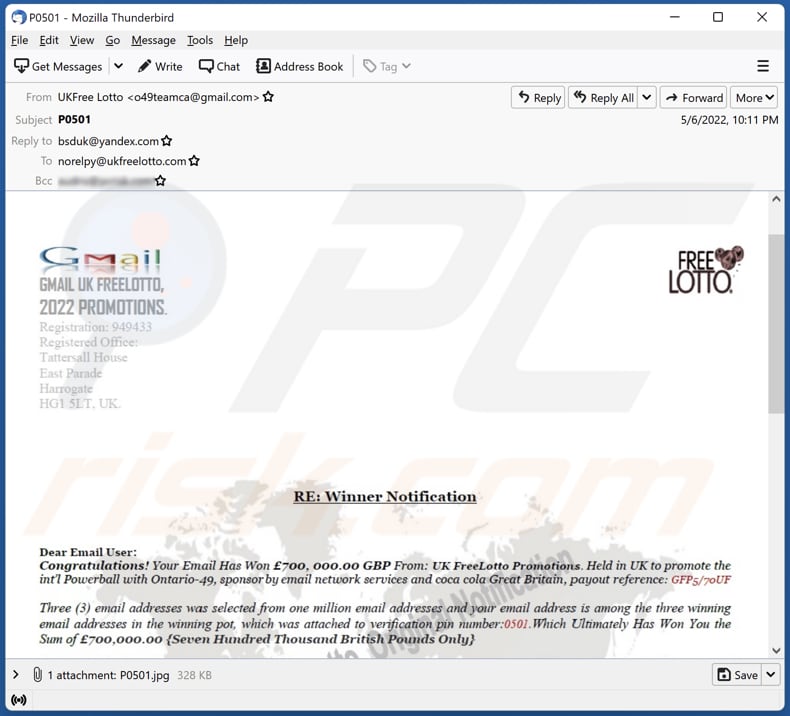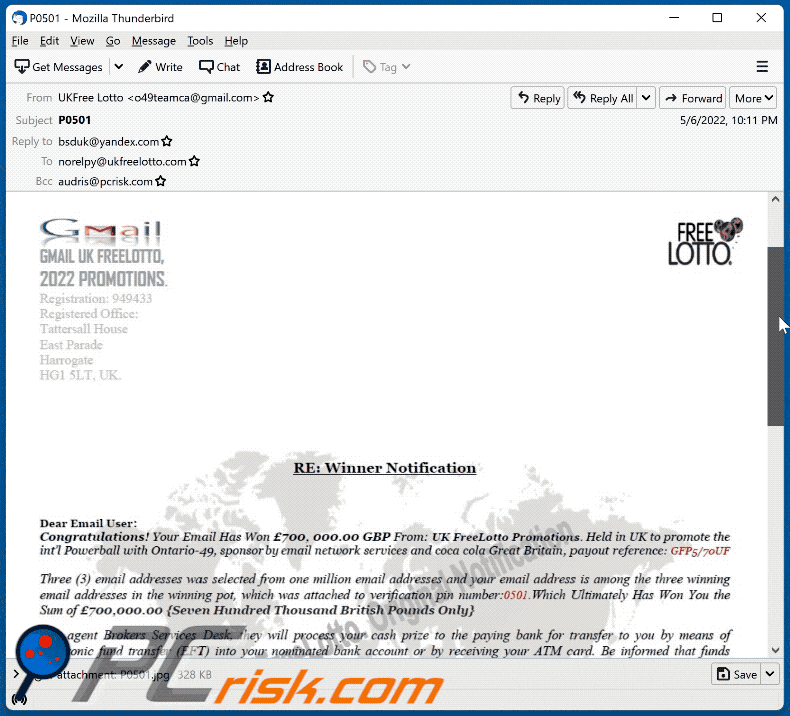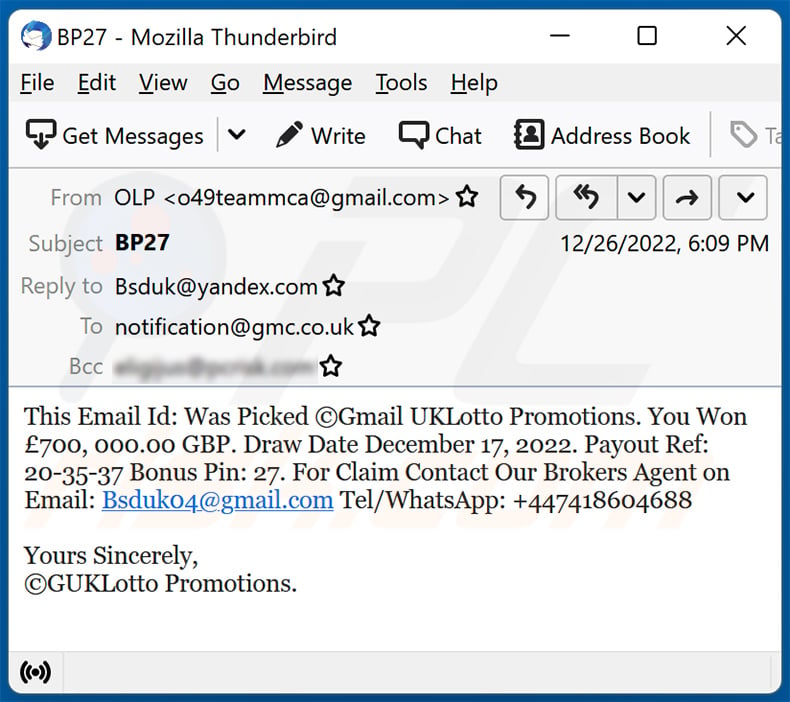How to spot scams like GMAIL UK FREELOTTO email Scam
Phishing/ScamAlso Known As: GMAIL UK FREELOTTO phishing email
Get free scan and check if your device is infected.
Remove it nowTo use full-featured product, you have to purchase a license for Combo Cleaner. Seven days free trial available. Combo Cleaner is owned and operated by RCS LT, the parent company of PCRisk.com.
What is "GMAIL UK FREELOTTO" email scam?
We have examined this email and concluded that it is a fake message (winner notification) about winning a lottery from Google (Gmail). Typically, scammers behind such emails seek to trick recipients into providing sensitive information and (or) transferring money (paying some "fees"). It is strongly advisable to ignore and delete emails of this type.

"GMAIL UK FREELOTTO" email scam in detail
Scammers behind this email claim that your email address has won £700,000.00 from UK FreeLotto Promotions. They instruct you to send the winning and reference number to the provided email address (bsduk44@gmail.com). They state that an agent will process the cash prize after you provide your bank account number or ATM card details.
In most cases, such scams are used to trick recipients into providing credit card details and (or) other banking information, name, surname, address, etc., and paying a "processing/claim/courier free". These emails are fraudulent and should be ignored.
| Name | GMAIL UK FREELOTTO Email Scam |
| Threat Type | Phishing, Scam, Social Engineering, Fraud |
| Fake Claim | Recipients have won £700,000.00 from UK FreeLotto Promotions |
| Cyber Criminal Email Address | bsduk44@gmail.com |
| Disguise | Letter from the Google company |
| Symptoms | Unauthorized online purchases, changed online account passwords, identity theft, illegal access of the computer. |
| Distribution methods | Deceptive emails, rogue online pop-up ads, search engine poisoning techniques, misspelled domains. |
| Damage | Loss of sensitive private information, monetary loss, identity theft. |
| Malware Removal (Windows) |
To eliminate possible malware infections, scan your computer with legitimate antivirus software. Our security researchers recommend using Combo Cleaner. Download Combo CleanerTo use full-featured product, you have to purchase a license for Combo Cleaner. 7 days free trial available. Combo Cleaner is owned and operated by RCS LT, the parent company of PCRisk.com. |
Emails of this type in general
These emails usually are disguised as letters from existing (legitimate) companies, organizations, or other entities. Scammers use them to extract sensitive information (e.g., credit card details, login credentials) or to trick recipients into transferring money.
More examples of similar emails are "SYSTEM NOTIFICATION Email Scam", "Salvation Army Email Scam", and "Email Shutdown In Progress Email Scam". It is important to know that cybercriminals can use emails to distribute malware.
How do spam campaigns infect computers?
Emails used to distribute malware contain malicious attachments or links. The purpose of such emails is to trick recipients into opening malicious MS Office or PDF documents, JavaScript files, executable files, files in archives (like ZIP, RAR), or other files. Cybercriminals succeed when recipients execute malware by themselves.
How to avoid installation of malware?
Do not open files/attachments and links in irrelevant emails sent from unknown, suspicious addresses. In most cases, emails of this kind are used to deliver malware. Also, do not use unofficial websites and other unreliable sources to download files and software. Use official pages and direct links to download them.
Update and activate the installed software (and the operating system) with tools provided by its official developer. If you've already opened malicious attachments, we recommend running a scan with Combo Cleaner Antivirus for Windows to automatically eliminate infiltrated malware.
Apprarance of the "GMAIL UK FREELOTTO" email (GIF):

Text presented in the "GMAIL UK FREELOTTO" email scam letter:
GMAIL UK FREELOTTO,
2022 PROMOTIONS
Registration: 949433
Registered Office:
Tattersall House
East Parade
Harrogate
HG1 5LT, UK.
RE: Winner Notification
Dear Email User:
Congratulations! Your Email Has Won £700, 000.00 GBP From: UK FreeLotto Promotions. Held in UK to promote the int'l Powerball with Ontario-49, sponsor by email network services and coca cola Great Britain, payout reference: GFP5/7oUFThree (3) email addresses was selected from one million email addresses and your email address is among the three winning email addresses in the winning pot, which was attached to verification pin number:0501. Which Ultimately Has Won You the Sum of £700,000.00 {Seven Hundred Thousand British Pounds Only}
Our agent Brokers Services Desk, they will process your cash prize to the paying bank for transfer to you by means of electronic fund transfer (EFI) into your nominated bank account or by receiving your ATM card. Be informed that funds cannot be deducted because of the insurance policy place on it, until the mentioned cash prize reaches the sole winner/beneficiary's nominated bank account for security reason(s).
2022 UK FreeLotto Draws Date Sat, April 30, 2022. Noted with winning number: 1 -2-12-14 -19-29 and Bonus Number: 20
For security reasons, we advise any of the winners to keep their winner information confidential from the public until your claim is processed and your prize released to you this is part of our security protocol to avoid dual claiming and unwarranted advantage of this program by non-participant or unofficial personnel.
To Process The Release Of Your Cash Prize, You Are Required To Contact Our Agent, Brokers Services Desk With Details
Below:Brokers Services Desk UK
3 Kemble St, London, TVC2B 4TS.
Agents: Mrs. Dina Amr
Agents: Mr.Vyas Thompson
Phone: +44 1423530594
Telfax: +44 1423536594
Email: bsduk44@gmail.comYou're advised to send your winning and reference number to the broker agent that will facilitate the release of your cash prize
payout.Yours Sincerely,
Mr. Roger Ronald,
{Group Coordinator}
UKFreeLotto Corporation.
Another example of GMAIL UK lottery-themed scam email:

Text presented within:
Subject: BP27
This Email Id: Was Picked ©Gmail UKLotto Promotions. You Won £700, 000.00 GBP. Draw Date December 17, 2022. Payout Ref: 20-35-37 Bonus Pin: 27. For Claim Contact Our Brokers Agent on Email: Bsduk04@gmail.com Tel/WhatsApp: +447418604688Yours Sincerely,
©GUKLotto Promotions.
Instant automatic malware removal:
Manual threat removal might be a lengthy and complicated process that requires advanced IT skills. Combo Cleaner is a professional automatic malware removal tool that is recommended to get rid of malware. Download it by clicking the button below:
DOWNLOAD Combo CleanerBy downloading any software listed on this website you agree to our Privacy Policy and Terms of Use. To use full-featured product, you have to purchase a license for Combo Cleaner. 7 days free trial available. Combo Cleaner is owned and operated by RCS LT, the parent company of PCRisk.com.
Quick menu:
- What is GMAIL UK FREELOTTO phishing email?
- Types of malicious emails.
- How to spot a malicious email?
- What to do if you fell for an email scam?
Types of malicious emails:
![]() Phishing Emails
Phishing Emails
Most commonly, cybercriminals use deceptive emails to trick Internet users into giving away their sensitive private information, for example, login information for various online services, email accounts, or online banking information.
Such attacks are called phishing. In a phishing attack, cybercriminals usually send an email message with some popular service logo (for example, Microsoft, DHL, Amazon, Netflix), create urgency (wrong shipping address, expired password, etc.), and place a link which they hope their potential victims will click on.
After clicking the link presented in such email message, victims are redirected to a fake website that looks identical or extremely similar to the original one. Victims are then asked to enter their password, credit card details, or some other information that gets stolen by cybercriminals.
![]() Emails with Malicious Attachments
Emails with Malicious Attachments
Another popular attack vector is email spam with malicious attachments that infect users' computers with malware. Malicious attachments usually carry trojans that are capable of stealing passwords, banking information, and other sensitive information.
In such attacks, cybercriminals' main goal is to trick their potential victims into opening an infected email attachment. To achieve this goal, email messages usually talk about recently received invoices, faxes, or voice messages.
If a potential victim falls for the lure and opens the attachment, their computers get infected, and cybercriminals can collect a lot of sensitive information.
While it's a more complicated method to steal personal information (spam filters and antivirus programs usually detect such attempts), if successful, cybercriminals can get a much wider array of data and can collect information for a long period of time.
![]() Sextortion Emails
Sextortion Emails
This is a type of phishing. In this case, users receive an email claiming that a cybercriminal could access the webcam of the potential victim and has a video recording of one's masturbation.
To get rid of the video, victims are asked to pay a ransom (usually using Bitcoin or another cryptocurrency). Nevertheless, all of these claims are false - users who receive such emails should ignore and delete them.
How to spot a malicious email?
While cyber criminals try to make their lure emails look trustworthy, here are some things that you should look for when trying to spot a phishing email:
- Check the sender's ("from") email address: Hover your mouse over the "from" address and check if it's legitimate. For example, if you received an email from Microsoft, be sure to check if the email address is @microsoft.com and not something suspicious like @m1crosoft.com, @microsfot.com, @account-security-noreply.com, etc.
- Check for generic greetings: If the greeting in the email is "Dear user", "Dear @youremail.com", "Dear valued customer", this should raise suspiciousness. Most commonly, companies call you by your name. Lack of this information could signal a phishing attempt.
- Check the links in the email: Hover your mouse over the link presented in the email, if the link that appears seems suspicious, don't click it. For example, if you received an email from Microsoft and the link in the email shows that it will go to firebasestorage.googleapis.com/v0... you shouldn't trust it. It's best not to click any links in the emails but to visit the company website that sent you the email in the first place.
- Don't blindly trust email attachments: Most commonly, legitimate companies will ask you to log in to their website and to view any documents there; if you received an email with an attachment, it's a good idea to scan it with an antivirus application. Infected email attachments are a common attack vector used by cybercriminals.
To minimise the risk of opening phishing and malicious emails we recommend using Combo Cleaner Antivirus for Windows.
Example of a spam email:

What to do if you fell for an email scam?
- If you clicked on a link in a phishing email and entered your password - be sure to change your password as soon as possible. Usually, cybercriminals collect stolen credentials and then sell them to other groups that use them for malicious purposes. If you change your password in a timely manner, there's a chance that criminals won't have enough time to do any damage.
- If you entered your credit card information - contact your bank as soon as possible and explain the situation. There's a good chance that you will need to cancel your compromised credit card and get a new one.
- If you see any signs of identity theft - you should immediately contact the Federal Trade Commission. This institution will collect information about your situation and create a personal recovery plan.
- If you opened a malicious attachment - your computer is probably infected, you should scan it with a reputable antivirus application. For this purpose, we recommend using Combo Cleaner Antivirus for Windows.
- Help other Internet users - report phishing emails to Anti-Phishing Working Group, FBI’s Internet Crime Complaint Center, National Fraud Information Center and U.S. Department of Justice.
Frequently Asked Questions (FAQ)
Why did I receive this email?
Scammers behind this campaign have sent the same letter to all recipients. Typically, scammers obtain email addresses when they get leaked after data breaches.
I have provided my personal information when tricked by this email, what should I do?
If you have provided any account credentials, change all passwords as soon as possible. If cybercriminals asked you to provide (and you have provided) credit card details, ID card information, etc., contact corresponding authorities as soon as possible. The same applies if you have sent money to scammers.
I have downloaded and opened a file attached to an email used to deliver malware, is my computer infected?
It depends on the type of file that you opened. If the file was an executable, then most certainly, your computer is already infected. However, if it was a document (PDF, DOC, or similar), you may have avoided the infection. Opening malicious files is not always enough for computers to get infected.
I have read the email but didn't open the attachment, is my computer infected?
No, opening emails is harmless. It is clicking links and opening attached files that can infect computers.
Will Combo Cleaner remove malware infections that were present in email attachment?
Yes, Combo Cleaner can detect and eliminate almost all known malware. It is recommended to scan potentially infected computers using the full scan option because high-end malware can be hiding deep in the operating system.
Share:

Tomas Meskauskas
Expert security researcher, professional malware analyst
I am passionate about computer security and technology. I have an experience of over 10 years working in various companies related to computer technical issue solving and Internet security. I have been working as an author and editor for pcrisk.com since 2010. Follow me on Twitter and LinkedIn to stay informed about the latest online security threats.
PCrisk security portal is brought by a company RCS LT.
Joined forces of security researchers help educate computer users about the latest online security threats. More information about the company RCS LT.
Our malware removal guides are free. However, if you want to support us you can send us a donation.
DonatePCrisk security portal is brought by a company RCS LT.
Joined forces of security researchers help educate computer users about the latest online security threats. More information about the company RCS LT.
Our malware removal guides are free. However, if you want to support us you can send us a donation.
Donate
▼ Show Discussion